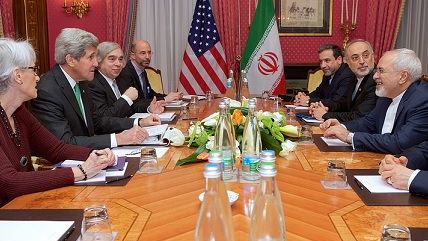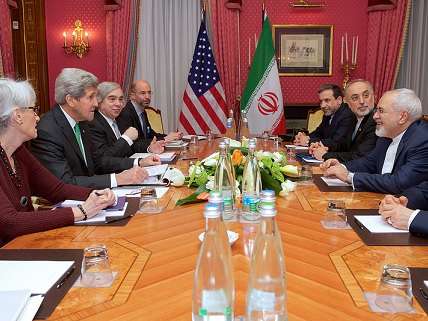It's Getting Stupid on Iran
From pretending only Republicans oppose a deal to pretending the U.S.' reputation is in jeopardy, the stupid on Iran is reaching new highs.


U.S., Iranian, and other negotiators from around the world are going to spend the next two and a half or so months hammering out a deal over Iran's nuclear program. They spent the last several years hammering out the "outline" which the deal will follow but that doesn't mean it's a done deal—within days of the announcement of an agreement on the outline of a deal, Iranian and U.S. officials exchanged accusations that the other side was lying about what exactly had been agreed to in the outline. With six countries, including Iran and the U.S., involved in negotiations, and powerful forces in the U.S. and Iran against a deal that could eventually rob them of their favorite respective stalking horses, a deal is far from certain. It could fail for a litany of reasons.
Domestic opposition to a deal, in the U.S., in Iran, or in any of the other countries participating in the talks is unlikely to scutltle a deal on its own, but would be politically useful to blame by a government reeling from a failure. Domestic opposition, of course, is real. In the U.S. a significant amount of members of Congress, Republicans and Democrats, oppose a deal. Liberals have tended to attribute domestic opposition solely to Republicans—Juan Cole laughably tried to connect billionaire donor Sheldon Adelson's political activity to the prevailing anti-Iran atmosphere among Republican presidential candidates. Cole, like others on the left, are obsessed with Citizen's United and corporations and other organizations of people spending money on political speech.
But the fact is an anti-Iranian mood has been around for longer than Adelson's had an interest in presidential politics, and despite the popular media perception, is not exclusive to Republicans. Attributing Republican opposition to monied interests or to a hatred of Obama is intellectually lazy at best. If opposition to an Iran deal were limited only to Republicans then, even though Republicans now control both houses of Congress, it wouldn't amount to much. When Fox News describes Obama and Congress on a "collision course" over Iran, that's possible because of Democrat opposition to an Iran deal.
Sen. Bob Corker (R-Tenn.), the chairman of the Senate foreign relations committee, has submitted review legislation that would give Congress the power to approve or reject a deal through a joint resolution and require the president to transmit information about the deal when it's struck and regularly after that. The president's threatened to veto the bill but Corker could muster the 67 votes needed to override a veto. There are only 54 Republicans in the Senate, so overriding a veto would require Democratic support. And that Corker has—more than half the original cosponsors to Corker's legislation caucus with the Democrats. Corker's legislation is peculiar because it doesn't rest on the arguments made in the Republican open letter to Iran—that the Senate has the Constitutional authority to approve a deal with Iran—but rather creates mechanisms by which Congress could hold hearings on the deal and take a binding vote that could prevent sanctions from being lifted. If the Congress does nothing, the deal would hold. Even when the president is exercising powers reserved to Congress—as when he made war in Libya—the Congress has been unwilling or unable to rebuke the actions.
The Associated Press, meanwhile, wonders if the Iran deal will "project weakness" on the part of the U.S., as if the last 20 years of U.S. foreign policy haven't "projected weakness" already. If leaders in places like Iraq, Egypt, Israel, and Palestine "read the fine print of the agreement the U.S. and other world powers hope to reach with Iran by June 30 and conclude that they were duped or have flinched," reads the AP analysis, "these leaders will be less likely to give in to pressure in the future, rendering the Iran agreement a lonely foreign policy achievement clouded by the region's chaos." At best, the AP analysis has mixed up the timeline—the Iran nuclear deal won't make it less likely other countries will give in to U.S. pressure but rather is a product of a world in which countries are less likely to give in to U.S. pressure than they were before.
For 35 years Iran has resisted U.S. pressure, effectively insomuch as the Islamic Republic still exists and the same regime is still in charge, and some Iran "skeptics" push for the U.S. to continue along that path, of applying pressure that's not working to change anything. More than half a century of pressure in the form of sanctions didn't weaken the Communist regime in Cuba or even convince it to return property seized from Americans. U.S. pressure on Iraq throughout the 90s did little more than pave the way for a costly and bloody war from 2003-2011. The pressure of that war did nothing to stop, and in fact created the conditions for, groups like ISIS to take root and spread in the region. Fourteen years of pressure in Afghanistan has left the Taliban more powerful than at any point since the 2001 U.S. invasion. U.S. pressure hasn't contributed to much positively since the collapse of the Soviet Union in 1991.
If—and it's a big if—the U.S., Iran, and the other countries participating in talks reach a deal over Iran's nuclear program, and if that deal holds, and if Iran abides by it, and then if the U.S. and other countries abide by it, that deal will be thanks in part to a multilateral kind of U.S. "pressure." It's not clear the U.S. should be involved in the Iran talks at all—Corker's legislation cites Iran's threat to the "common defense and security" of the U.S. but that threat has never been defined in a clear and compelling way. The U.S. is involved in talks because the American government took it upon itself to take the lead in negotiations with Iran. It wasn't necessary. The U.S. is not obligated to be the world's policeman, not on matters of nuclear proliferation nor anything else. But the U.S. government has inserted itself into the debate about Iran's nuclear program and carved out for itself a lead role. If the U.S. were to sink the deal now, years after negotiations began, that would do far more damage to its reputation on the international scene than anything opponents of a deal say the deal could do.


Show Comments (76)